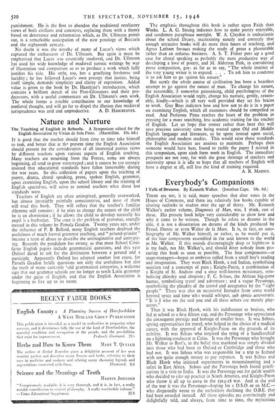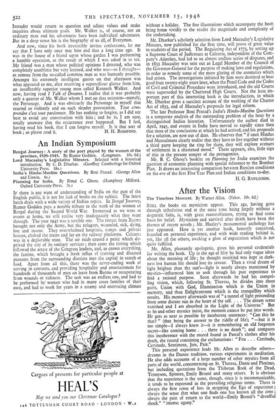Everybody's Companions
I Talk of Dreams. By Kenneth Walker. (Jonathan Cape. 10s. 6d.)
THERE are not, it is said, many speeches that alter votes in the House of Commons, and there are relatively few books capable of altering outlooks in readers over the age of thirty. Mr. Kenneth Walker's earlier volume, Diagnosis of Man, was, I think, one of these. His present book helps very considerably to show how and why it came to be written. Though he refers to dreams in the title, it is not a dissertation on dreams of the kinds produced by Freud, Dunne or even Walter de la Mare. It is, in fact, an auto- biography of Mr. Walker himself, or rather, as he would put it, of the four components assembled in the unit known to the world as Mr. Walker. If this sounds discouragingly deep or highbrow it is my fault, not Mr. Walker's, and should deter nobody from pro- curing this book as soon as possible. The four components—or stage-managers--began as embryos culled from a small boy's reading and imagination. They were Black Hawk, a red Indian, symbolising stoicism and a contempt of pain ; Knight-Paton, a combination of a Knight of St. Andrew and a once well-known missionary, sym- bolising chivalry and altruism ; F. C. Selous, the African big-game hunter, symbolising travel and adventure ; and a vague Personage, symbolising the plaudits of the crowd and acceptance by the " right people." There was also an occasional Intruder from some world beyond space and time wh3 would whisper, sub specie aeternitatis. "It is I who am the real you and all these others are merely play- actors."
Thus it was Black Hawk, with his indifference to bruises, who led at school to a first fifteen cap, and the Personage who appreciated the consequent prestige and homage of smaller boys. It was Selous, spying opportunities for travel, who helped in the choice of a medical career, with the approval of Knight-Paton on the grounds of its nobility. It was Selous who inspired the tying of a handkerchief on a lightning conductor at Caius. It was the Personage who brought Mr. Walker to Bart's, in the belief that mankind was simply divided into those who had been to Oxford or Cambridge and those who had not. It was Selous who was responsible for a trip to Iceland with not quite enough money to pay expenses. It was SelOus and Black Hawk who initiated experiments in mountaineering and a safari in East Africa. Selous and the Personage both found gratifi- cations in a visit to India. It was the Personage out for quick wealth who decided to take up practice in South America, and Knight-Paton who threw it all up to serve in the 1914-18 war. And at the end of the war it was the Personage—hoping for a D.S.O. or an M.C.- who disgustedly wrote to the authorities declining the O.B.E. that had been awarded instead. All these episodes are convincingly and delightfully told, and always, from time to time, the mysterious Intruder would return to question and adjust values and make inquiries about ultimate goals. Mr. Walker is, of course, not an ordinary man and his adventures have been individual adventures. But in a deep sense his is the biography of us all, of Everyman.
And now, since his book irresistibly invites confessions, let me say that I have only once met him and that a long time ago. It was in the house of a friend upon whose garden I was performing a humble operation, as the result of which I was asked in to tea. My friend was a man whose political opinions I detested, who was completely unathletic but very learned, and who was—so I thought— as remote from the so-called common man as was humanly possible. Amongst his extremely intelligent guests on that afternoon was what appeared to me, after receiving a supercilious glance from him, an insufferably superior young man called Kenneth Walker. And now, having read I Talk of Dreams, I realise that it was probably only a quarter of Mr. Walker whom I met on that occasion—namely, the Personage. And it was obviously the Personage in myself that reacted so violently and on such slender provocation. Tout corn- prendre c'est tout pardonner. He has nothing to forgive, as I did my best to avoid any conversation with him ; and he is, I am sure, totally unaware that the occurrence ever happened. But I feel, having read his book, that I can forgive myself. It is that sort of



































 Previous page
Previous page